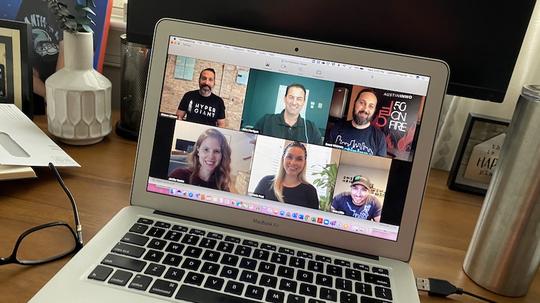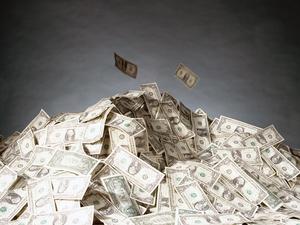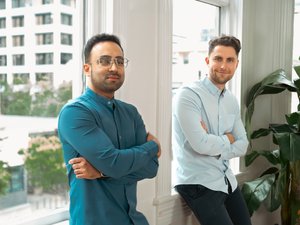
The severity of the Covid-19 pandemic snuck up on most of us in the early days. But, all too quickly, reality set in and startup founders everywhere went into a scramble to adjust.
In some cases, that meant confronting the virus almost head-on with health technologies. In other cases, it led startups to find new ways to find safe food options or look to the horizon for solutions that might help us in the weeks, months and maybe years ahead.
Austin Inno and Hypergiant Industries teamed up for a conversation with leaders at three Austin startups on Wednesday for a closer look at how they've quickly pivoted and what's next on their path forward.
To kick things off, Hypergiant provided a quick overview of a new tool it developed called the Post Covid Emissions Simulator, which shows the impacts of Covid-19 disruptions on pollution and climate change and what it means over time as we resume different activities.
Hypergiant also broke a little news, which we'll have more on in coming days. The company is building a prototype next generation sanitization robot that navigates around obstacles and uses UV light to sanitize rooms in offices and other settings. (Stay tuned to the Beat newsletter for more on that as it emerges.)
Below are a few quick insights from the conversation between moderator Shawn Ullman, vice president of hype and culture at Hypergiant, and panelists Jenifer Dasho, CMO at Everlywell, Vinder founder and CEO Sam Lillie and John Hartigan, marketing director at Quantum Materials Corporation.

You can watch the entire event by following this link to the recording.
How these startups pivoted
Dasho: Digital health startup Everlywell had been focused on its 30-plus at-home health test kits. When the news of the outbreak spread in early February, the company initially thought testing and other responses would likely be aptly handled by the government and traditional health care services.
"We, like much of the public, didn’t realize how dire the situation was going to be regarding testing," she said.
The startup sprang into action when it realized both the need and the opportunity in mid February. And it developed a Covid-19 test kit and associated backend changes in 13 days -- something its team would usually budget about three months for.
As part of that, it used $1 million of its own fund to provide developmental grants to labs that could qualify to process the at-home Covid-19 tests. Then, it integrated new labs into their systems to communicate results, in addition to new purchase flows, check outs and the new test kit.
"They were just really motivated and dedicated and drive by the fact that we truly felt like we could make a difference," she said.
Everlywell couldn't initially distribute direct to consumers and instead focused on getting tests for frontline workers. It continues to work with the FDA to get an at-home test as soon as possible.
Hartigan: Quantum Materials Corp's QVS Platform merges digital blockchain tech with physical quantum dot technologies to create anti-counterfeiting products to secure product supply chains.
Its work on that set the team up to pivot a bit and develop another concept using blockchain to verify Covid-19 test kits and provide an immunization passport that could help people prove their health status without handing over other personal information. (Read more about it here.)
There's no clear way to show your health status in this new pandemic, and the situation continues to evolve.
"We realized that this is going to carry on and there's most likely going to be multiple test phases over a long period of time," he said. The company focused on its strength in identifying and verifying information and physical items. With that, it developed an immunity passport concept that could help people go back to work safely -- and fend against black market and fake documents people might use to get back to work.
That led to the QDX Health ID app that works with test kit makers and health care providers to authenticate individuals, kits, health professionals and track individual results in an app. The user gets to choose who they share the information with. The company plans to launch its initial version of the app on June 1.
Lillie: "When Covid-19 hit... it screwed the supply chain when it comes to food," he said. That means small farms, restaurants, distributors. "The whole thing got rocked to the core."
Vinder was built on community -- connecting people with local food. He started thinking of our food system in a new way.
"What can we do to look at a fully decentralized food system?" he said. "Where are the sellers, where are the suppliers, where are the producers?"
Vinder offered a no-cost platform to restaurants to sell direct to consumers. It saw layoffs at restaurants and started hiring those newly unemployed workers as drivers for Vinder.
Under Texas cottage food law, you can bake bread, cupcakes and many other goods at home and sell to consumers and make up to $50,000 a year. That helped Vinder bring them onto the platform to help home bakers with supplemental income.
On working from home
Dasho: Everlywell wasn't really a work from home culture. So it was a big change that started with executives meeting almost daily leading up to Mayor Steve Adler's announcement that people had to stay at home.
The team had to think through access to information, providing engineers with computer setups that had to be transferred and how to onboard incoming employees who are starting without an office.
They instituted three-times-a-week all-hands meetings that included light-hearted moments along with the serious news.
Hartigan: Quantum Materials Corp.'s team already had remote work infrastructure set. But they usually met face-to-face once a week, in addition to the work going on at its production facility in San Marcos, which was allowed to continue operating throughout the pandemic lockdowns.
At first, he said it didn't bother him when the company started doing tele conference meetings and people didn't use their webcams. But, then, he started to realize that face-to-face experience, even in a digital format, is meaningful.
"You start to go 'wow, I miss people,'" he said. "So for us we started to turn our cameras back on."
They also started having social meet ups for non-work discussions. "We all know it's important and heathy and helps keep balance," he said.
Lillie: Vinder's developers and drivers are set up mostly remotely. Lillie still meets his drivers in the morning and does his own deliveries.
"For me, the type of leader I want to be leads from the front is going to be there," he said. "If I've got guys on the front line, so am I. So I think that has created much more of a bond and shows new hires what kind of a culture we really represent here at Vinder."







